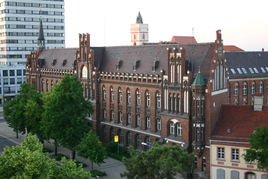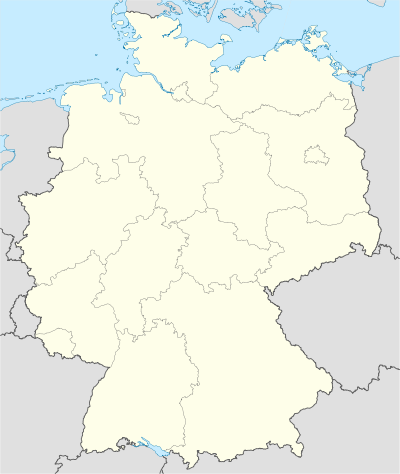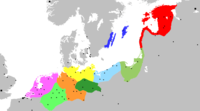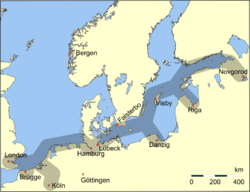Frankfurt (Oder)
| Frankfurt (Oder) | |
 |
|
 |
|
 Frankfurt (Oder)
|
|
| Coordinates | |
| Administration | |
| Country | Germany |
|---|---|
| State | Brandenburg |
| District | Urban district |
| Lord Mayor | Martin Patzelt (CDU) |
| Basic statistics | |
| Area | 147.61 km2 (56.99 sq mi) |
| Elevation | 19-135 m |
| Population | 60,625 (31 December 2009)[1] |
| - Density | 411 /km2 (1,064 /sq mi) |
| Other information | |
| Time zone | CET/CEST (UTC+1/+2) |
| Licence plate | FF |
| Postal codes | 15201–15236 |
| Area code | 0335 |
| Website | www.frankfurt-oder.de |
Frankfurt (Oder) (German pronunciation: [ˈfʁaŋkfʊɐt]) is a town in Brandenburg, Germany, located on the Oder River, on the German-Polish border directly opposite the town of Słubice which was a part of Frankfurt until 1945. At the end of the 1980s it reached a population peak with more than 87,000 inhabitants. The number dropped below 70,000 in 2002 and is expected to reach 58,000 in 2010.[2]
The official name Frankfurt (Oder) and the older Frankfurt an der Oder are used to distinguish it from the larger city of Frankfurt am Main.
Contents |
History
The town of Frankfurt was chartered in 1253 at the Brandendamm, although the settlement is probably considerably older. The early settlers lived on the western banks of the Oder; later the town was extended to the eastern bank (today's Słubice). In late medieval times the town dominated the river trade between Breslau (Wrocław) and Stettin (Szczecin). In 1430 Frankfurt joined the Hanseatic League, but was a member for only a short time.
In April 1631, during the Thirty Years' War, Frankfurt was the site of the Battle of Frankfurt an der Oder between the Swedish Empire and the Holy Roman Empire.[3] After a two-day siege, Swedish forces, supported by Scottish auxiliaries,[4] stormed the town.[3] The result was a Swedish victory.[3][4]
With the dissolution of the Margraviate of Brandenburg during the Napoleonic Wars, Frankfurt became part of the Province of Brandenburg in 1815. In the 19th century, Frankfurt played an important role in trade. Centrally positioned in the Kingdom of Prussia between Berlin and Poznań, on the heavily-trafficked river Oder, the town housed the second-largest annual trade fair (Messe) of the German Reich, surpassed only by that in Leipzig.
There was intense fighting for the town in 1945 during World War II when the town was declared a fortress (Festung) in an attempt to block the Red Army's route to Berlin. The postwar German-Polish border ran along the Oder, separating the Dammvorstadt on the eastern bank from the rest of Frankfurt; it became the Polish town of Słubice. While part of communist East Germany, Frankfurt was administered within Bezirk Frankfurt (Oder). It became part of the reconstituted state of Brandenburg with German reunification in 1990.
Today, Frankfurt and Słubice have friendly relations and run several common projects and facilities. Poland joined the European Union on 1 May 2004, and implemented the Schengen Agreement on December 21, 2007 leading to the removal of permanent border controls.
In the post-communist era Frankfurt has suffered from high unemployment and low economic growth. Its population has fallen significantly from around 87,000 at the time of German reunification in 1990.
FC Viktoria Frankfurt is the town's local football team.
In March 2008 the Jewish community of Frankfurt celebrated its first Torah dedication since the Holocaust. The procession of the new Torah scroll began from the spot where the town's Frankfurter Synagogue stood prior to World War II, 500 meters from Germany's current border with Poland. Celebrants, including students from the University of Illinois Urbana-Champaign, marched the scroll into the town's Chabad-Lubavitch center, where they danced with the Torah that was donated by members of the Chabad-Lubavitch community in Berlin.
European university
The Margraviate of Brandenburg's first university was Frankfurt's Alma Mater Viadrina, founded in 1506 by Joachim I Nestor, Elector of Brandenburg. An early chancellor, Bishop Georg von Blumenthal (1490–1550), was a notable opponent of the Protestant Reformation, as he remained a Catholic. Frankfurt also trained the noted archbishop Albert of Brandenburg around 1510, who also became a vocal opponent of the Reformation. The university was closed in 1811, and its assets divided between the new universities in Berlin (today's Humboldt University) and Breslau (University of Wrocław).
The university was refounded in 1991 with a European emphasis as the Viadrina European University, with close cooperation with the Adam Mickiewicz University in Poznań; they jointly run the Collegium Polonicum in Słubice.
International relations
Frankfurt (Oder), being located on the border to Poland, plays a special role in what concerns German-Polish relations and European integration. The European University Viadrina has one of its buildings in Poland, in the neighbour town Słubice. The university also has number of projects and initiatives dedicated to bringing Poland and Germany together, and offers its students pro bono Polish courses. Another project which contributes to the German-Polish integration in Frankfurt (Oder) is the fforst house, a German-Polish student project which has been granted support by the town's administration [5] and by the Viadrina[6], having been described by the former president of the university, Gesine Schwan, as the place where "Europe begins" [7] .
Twin towns and sister cities
Frankfurt (Oder) is twinned with:
|
Films set in Frankfurt
In recent years, Frankfurt has been the setting for several notable German films:
- Halbe Treppe (Grill Point, 2002)
- Lichter (Distant Lights, 2003)
- Die Kinder sind tot (The Children Are Dead, a documentary about a 1999 murder-by-neglect in Frankfurt, 2004)
- No Exit (2004, documentary about Neo-Nazis)
- Kombat Sechzehn (Combat Sixteen, 2005)
Gallery
|
The Gothic town hall |
Viadrina European University, with the tower of the Marienkirche |
The town archives and the C.P.E. Bach Concert Hall |
The Oderturm, tallest building in Frankfurt |
|
The neo-Gothic post office |
The Friedenskirche |
The Oder bridge joining Frankfurt with Słubice |
View of northern Frankfurt riverfront |
|
Main railway station |
Große Scharrnstraße, rebuilt in the late 1980s |
 View from the Oderturm |
 The Paulinenhof settlement, built in the 1920s for railway employees |
 Old East German passport stamp from Frankfurt (Oder). |
 Reunified Germany passport stamp from same border crossing. |
 Schengen passport stamp for the same border crossing. |
See also
- Stadtarchiv Frankfurt (Oder)
- Helenesee
References
- ↑ "Bevölkerung im Land Brandenburg am 31.12.2009 nach amtsfreien Gemeinden, Ämtern und Gemeinden. Gebietsstand: 31.12.2009" (in German). Amt für Statistik Berlin-Brandenburg. 31 December 2009. http://www.statistik-berlin-brandenburg.de//Publikationen/OTab/2010/OT_A01-04-00_124_200912_BB.pdf.
- ↑ "Bevölkerungsprognose (Ergänzungsbericht)" (in German) (PDF). Kommunalen Statistikstelle der Stadt Frankfurt (Oder). February 2006. http://www.frankfurt-oder.de/ffo/CMSDocs?querymask=ELC3WBFI1NJEZ2&download=Bev%C3%B6lkerungsprognoseErg%C3%A4nzungFebruar2006.pdf. Retrieved 2007-01-22.
- ↑ 3.0 3.1 3.2 Bröckling (1998), p.57
- ↑ 4.0 4.1 Mackillop (2003), p.64
- ↑ http://www.ad-hoc-news.de/sprachgewirr-feature-am-freitisch-bei-frankfurts--/de/Politik/20905387
- ↑ http://www.euv-frankfurt-o.de/de/struktur/verbundene_einrichtungen/foerderkreis/index.html
- ↑ http://www.berlinonline.de/berliner-zeitung/archiv/.bin/dump.fcgi/2010/0503/brandenburg/0011/index.html
Bibliography
- Bröckling, Ulrich; Sikora, Michael (1998) (in German). Armeen und ihre Deserteure: Vernachlässigte Kapital einer Militärgeschichte der Neuzeit. Vandenhoeck & Ruprecht. ISBN 3525013655. http://www.google.de/books?id=ol0-R3AayIYC&pg=PA57. Retrieved 2009-08-27.
- Mackillop, Andrew; Murdoch, Steve (2003). Military governors and imperial frontiers c. 1600-1800: A study of Scotland and empires. BRILL. ISBN 9004129707. http://www.google.de/books?id=XlFrbYjhEboC&pg=PA64. Retrieved 2009-08-27.
External links
- The City of Frankfurt (Oder) has a website (available in English translation as well as in German and in Polish) with some limited commerce and cultural information.
- slubice.pl - official site of Frankfurt's border town Słubice
- www.frankfurt.pl & www.slubice.de - a student project
- Tram Frankfurt (Oder)
|
||||||||
|
|||||||
|
||||||||||||||||||||||||||

